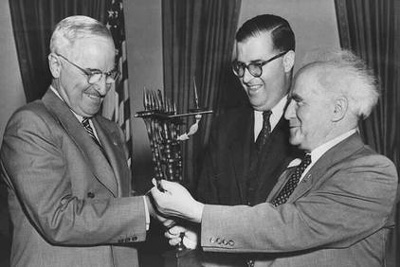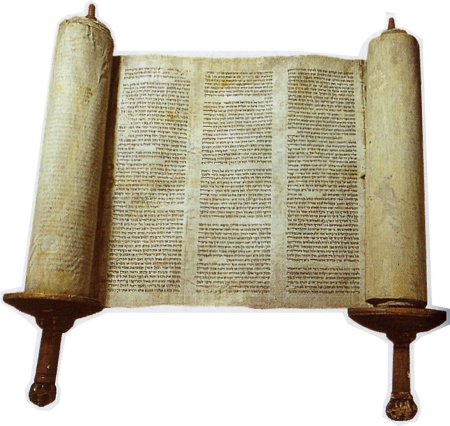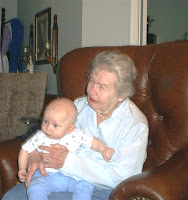 I heard a story about President Truman last week that dealt with his role in recognizing Israel as a nation shortly after Israel became a modern Jewish nation. I decided to check it out. I present to you a couple of gleanings from the internet.
I heard a story about President Truman last week that dealt with his role in recognizing Israel as a nation shortly after Israel became a modern Jewish nation. I decided to check it out. I present to you a couple of gleanings from the internet.
The first is from the Skirball Museum in Los Angeles.

To mark its celebration of the 50th anniversary of Israel, the Skirball Museum borrowed some very special objects from the Truman Library in Independence, Missouri -- a Torah, a Torah case, a manuscript, two busts, a pair of glasses, a cane, and a replica of a desk plaque.
Why does a Jewish museum in Los Angeles have to ask an institution in America's heartland to lend a Torah, or a Torah case? These particular ones had been given to Harry S Truman by Israeli President Chaim Weizmann in recognition of the U.S. President's decision in 1948 to recognize the new State of Israel.
The small Torah was presented at the White House to Truman only 11 days after Israel became independent. According to Larry Hackman, director of the Truman Library who was on hand for the opening of the Skirball exhibit last week, "Truman hadn't been briefed by his staff and didn't know what a Torah was. He sort of looked at it, then looked at Weizmann and said, 'Thanks, I've always wanted one of these.'"
By 1956, three years after leaving the Presidency, Truman was very much aware of what a Torah was and its symbolic importance, Hackman added in an interview. He quoted Abba Eban, who in 1956 was Israel's ambassador to the United States, telling of Truman showing him the Torah and saying 'This is my prized possession.'"

A picture of Truman and Weizmann with the Torah is the cover photograph of a brochure issued for the small exhibit. It is an appropriate illustration for a booklet which argues that it was Truman's religious convictions about Israel--and not political considerations--which persuaded him to overrule his popular Secretary of State George Marshall and to extend de facto recognition to Israel within a quarter of an hour after David Ben-Gurion declared the Jewish state to have come into existence. De Jure recognition was granted in 1949 after Israel swore in its first government.

Inside the booklet an essay by Michael T. Benson, author of Harry S Truman and the Founding of Israel, noted that by the time Truman was 14 years old he had read the Bible cover-to-cover at least four times. "As one reviews the record, it is apparent that Truman's conversance with the history of the Middle East and his knowledge of the Bible played a significant part in his attempt to formulate his own presidential policy toward Palestine," the historian wrote.
"He was heavily influenced by a biblical upbringing well-larded with Judeo-Christian themes and by a Baptist training that stressed a Jewish return to Zion. Truman's favorite psalm, number 137, is illustrative of this background: 'By the rivers of Babylon, there we sat down, yea, we wept, when we remembered Zion.'"
Benson went on to argue that Truman "insisted that the Old Testament had made a commitment to the Jewish people that someday they would have a homeland of their own."

A touch screen exhibit at the Skirball Museum features a videotaped conversation with George Elsey, a deputy in 1948 to Truman's presidential aide Clark Cifford. It was the lawyer Clifford who in a legendary Oval Office showdown debated Marshall over the appropriateness of recognizing Israel.
Asked about charges by some academics that the only reason Truman recognized Israel was his desire to curry favor with Jewish voters, who represented an important part of the electorate, Elsey made this reply:
"In February of '48, just three months earlier, Harry Truman sent his civil rights message to Congress, the boldest, bravest, message on civil rights that any president had ever sent to the Congress. It laid out the ground rules for the debate on civil rights in this country for the next 30 years. Would you say that he was just doing this for the Black vote? No he did it because he believed it was the right thing to do, despite the consequences. And one of the consequences, in the case of civil rights, was the defection of a large part of his party -- the Democratic party. I think there's a degree of comparability here. He did what he knew was right. Sure, there were some political advantages to it, but there were enormous disadvantages.

"In the case of Israel," Elsey added, "there were some political advantages, but there were a great many negatives as well. In both cases, he was doing what he believed was the right thing for the nation, for the American people..."
Hackman, the Truman Library director, suggested that although Truman was a modest man, not given to expressions of grandeur, he may have voiced his true feelings about recognizing Israel, years after leaving office. When a person complimented him for being "important" to the creation of the State of Israel, he responded sharply, "Important, hell! I am the American Cyrus."

Cyrus was the Persian ruler who defeated the Babylonian ruler Nebuchadnezzar and allowed the Jews in 538 BCE to leave their captivity and to return to Zion, exactly as they had prayed to do in Truman's favorite psalm.
Grace Cohen Grossman, the Skirball's senior curator, pointed out during an interview that prior to Truman's decision to recognize Israel, the American president was lobbied heavily by American Zionists. She said Truman told them "it is not about getting your vote; lobbying in this regard won't help." In fact, the curator added, in the subsequent 1948 election against Republican presidential candidate Thomas Dewey, Truman "lost New York and Pennsylvania, two states where there were large Jewish communities, yet still won the election."

The Sephardic style Torah case fromWeizmann was presented to Truman by Eliyahu Elath, Israel's first ambassador to the United States and predecessor to Eban. A bust of Weizmann also was loaned to the Skirball from the Truman Library, but the bust of Truman, himself, came not from the Truman Library but from the Lyndon B. Johnson Library. Grossman explained that the Truman Library needs such a bust for its permanent exhibit, while the Johnson Library does not.
Another exhibit borrowed from the Truman Library was "a manuscript of Exodus given to Truman by Leon Uris," its author. The novel about Israel's struggle for independence is turned to a page describing Israelis listening to the news over the radio that the British mandate in Palestine has come to an end.
"My favorite part as a curator, in terms of feeling a personal link to Truman, is that we were also able to borrow his glasses and cane," Grossman said. "He was well-known for walking with a walking stick and there is something about touching the actual glasses used by a President. Of course, this (plaque) is a replica of the famous motto 'The Buck Stops Here' which is part of the lore of Truman."
This is an excerpt of an article from Dave Kopel in the National Review.

In the latest issue of Books & Culture, a Christian book review monthly, details the role of Truman's Southern Baptist faith in his Israel policy.
While mainline Protestants (with some important exceptions, such as Schlesinger's friend Reinhold Niebuhr) tended to disparage Zionist hopes for a Jewish state, religious conservatives (a group that included people like Truman who were not necessarily political conservatives) rejoiced in Zionist aspirations as the fulfillment of prophecy and the just restoration of the Jewish homeland which God had promised the Jews by sacred covenant.
Only hours after the declaration of the State of Israel, President Truman overrode the objections of the State Department and the War Department, and made the United States the first nation to grant recognition to Israel. Truman used American clout to convince the U.N. to recognize Israel, too.

When ceasefire lines were being drawn after the failed Arab war to exterminate the Jews, Truman insisted that Israel have the Negev, which more than doubled Israel's territory. Israelis believed that without Truman they would not have survived.
As recounted in the Second Book of Chronicles, in the 6th century B.C. the Jewish kingdom was conquered by the Babylonian Empire, the Temple was destroyed, and the Jews were carried into Babylonian captivity. Half a century later, the Babylonian Empire was overthrown by the Persian Empire of Cyrus the Great. Cyrus allowed the Jews to return to their holy land.
 Tuesday, May 15th of this year as I was driving home from work, I learned of the passing of Reverend Jerry Falwell.
Tuesday, May 15th of this year as I was driving home from work, I learned of the passing of Reverend Jerry Falwell.
During his lifetime Falwell certainly said some things that raised a lot of ire. For example:
In 1980, he disclosed a conversation that he had with then President Carter in which he chided the President of having gay staff members. Later that year he told NBC News that he did not believe that GOD heard the prayers of Jews or unredeemed gentiles. He later denied making this statement after meeting with an American Jewish Committee rabbi.

Later that same year,Falwell is forced to pay gay activist Jerry Sloan $5,000 after losing a court battle. During a TV debate in Sacramento, Falwell denied calling the gay-oriented Metropolitan Community Churches “brute beasts” and “a vile and Satanic system” that will “one day be utterly annihilated and there will be a celebration in heaven.” When Sloan insisted he had a tape, Falwell promised $5,000 if he could produce it. Sloan did so, Falwell refused to pay and Sloan successfully sued. Falwell appealed, with his attorney charging that the Jewish judge in the case was prejudiced. He lost again and was forced to pay an additional $2,875 in sanctions and court fees.

In 1987 the Federal Election Commission fines Falwell for transferring $6.7 million in funds intended for his ministry to political committees.
That same year, he won $200,00 in a libel suit against Hustler magazine for publishing a parody article mocking him and his ministry. The next year, the Supreme Court of the United State overturned the award.

The Internal Revenue Service determines in 1993 that funds from Falwell’s Old Time Gospel Hour program were illegally funneled to a political action committee. The IRS forced Falwell to pay $50,000 and retroactively revoked the Old Time Gospel Hour’s tax-exempt status for 1986-87.

In 1994 Falwell uses The Old Time Gospel Hour to hawk a video tape called “The Clinton Chronicles” that Falwell had spent $200,000 bankrolling. In the video Falwell is interviewing a reporter that has his features blocked by shadow. The reporter tells of being in fear for his life because he is exposing President Clinton’s dirty secrets. This "reporter" was actually one of Falwells staff.

One of the greatest accomplishments of Falwell’s life was the creation of Liberty University. But in 1997, the school was having severe financial problems. Falwell accepted a $3.5 million gift from a group that was a front for the Reverend Sun Young Moon of the Unification Church.

In 1999, Falwell tells a pastor’s conference in Kingsport, Tennessee that the Anti-christ prophesied in the Bible is alive today and is Jewish.

When my grandson was very young, he came to spend mornings at my house. We watched the Teletubbies. It was his favorite TV show at the time. Falwell speculated in 1997 that Tinky Winky, the Teletubbie that carried a purse was gay. Apparently Reverend Falwell was also a Teletubbie viewer.

Perhaps the most astounding words to come out of the mouth of Reverend Falwell occurred after 09/11 when he announced that it was America’s fault.
I have read a number of commentaries and blogs that have said some very awful things about this man. As a Christian I have no problem with folks having an opinion. I would not bother with this blog but for my opinion. However as a Christian I believe that GOD is the Judge of all men. I further believe that GOD's only begotten son JESUS died as a sacrifice for the sin of all who believe and accept HIM as the SON OF GOD. Please note that the word “sin” as I am using it, has to do with being apart from GOD, not necessarily the nasty things we do or say that affect others and affect other’s opinions of us.
Falwell had some wonderful accomplishments such as the Thomas Road Church and Liberty University. In his own way I am sure that he loved THE LORD. And I believe that in his own way he believed his version of the Word of GOD. He was no doubt a wonderful and devoted father and husband. He accepted JESUS into his heart as LORD and Savior. A common theme that runs through this thing called The Christian Church is losing sight of The Goal. Looking at all the negative things Brother Falwell did we can see that he took a wrong turn down a rough patch of highway. As attested by some folks that have commented on this subject. Later in his life Falwell did get out of the political and social arena and back on track of The Goal.

I feel that once you have felt the experience of being saved by the Grace of GOD through HIS SON JESUS and your life has changed, you should be as Paul says, an ambassador. In hindsight it is so easy to second guess what one would do if they were in Falwell’s shoes. However we all have grown up with different surroundings and situations that make us into what we are and what we become. May GOD accept the fact that he accepted JESUS as his LORD and Savior. Amen.
 SPRINGBORO - A southwest Ohio woman who loves Starbucks coffee has decided to drop the Starbucks habit because she was offended by a religious-related statement the company printed on the side of a cup.
SPRINGBORO - A southwest Ohio woman who loves Starbucks coffee has decided to drop the Starbucks habit because she was offended by a religious-related statement the company printed on the side of a cup.
Michelle Incanno, of Springboro, said she got an unexpected jolt when she saw the statement on a cup of coffee she bought last week.

Printed on the cup was:

"Why in moments of crisis do we ask God for strength and help? As cognitive beings, why would we ask something that may well be a figment of our imaginations for guidance? Why not search inside ourselves for the power to overcome? After all, we are strong enough to cause most of the catastrophes we need to endure."
The statement is attributed to Bill Schell, a Starbucks customer from London, Ontario, and was included on the cup as part of an effort by the company to collect different viewpoints and spur discussion.

"As someone who loves God, I was so offended by that. I don't think there needs to be religious dialogue on it. I just want coffee," said Incanno, who is Catholic.

Incanno wasn't satisfied with a company disclaimer saying the quote is the author's opinion, not necessarily that of Starbucks.
It invites customers to respond at www.starbucks.com/wayiseeit.
Tricia Moriarty, spokeswoman for the Seattle-based Starbucks, said the collection of thoughts and opinions are inspired by "the old coffeehouse tradition of thoughtful discussion" on a variety of issues, including religion.
The company chooses about 30 new quotes every few months, she said. By the end of 2007, nearly 300 quotes will have been printed since the program began in January 2005.
Here is a phrase that I am certain you will never see on a Starbucks tall mocha latte:
 Mother's Day is approaching. I ran across this poem by Billy Collins.
Mother's Day is approaching. I ran across this poem by Billy Collins.
I'm not sure if this is the same Billy Collins that beat me up when I was in the third grade as I was walking home from school. If it is, I'm glad he has discovered a way to vent by writing poetry.

His poem struck the same nerve in me that he must have felt.
Those hot July & August days when I was a pup were supplemented by walking to the elementary school and spending time with some older kids that were hired (or drafted by their parents) to entertain us squirts by teaching Arts & Crafts.

Now by Arts & Crafts I mean, how to make potholders from circles of elastic fabric and how to make lanyards. Of course potholders were very useful, but totally uncool. However lanyards flat-out rocked.
I present Billy Collin's poem, The Lanyard.

The other day as I was ricocheting slowlyoff the blue walls of this room bouncing from typewriter to piano from bookshelf to an envelope lying on the floor,
I found myself in the "L" section of the dictionary where my eyes fell upon the word, Lanyard.
 No cookie nibbled by a French novelist could send one more suddenly into the past.
No cookie nibbled by a French novelist could send one more suddenly into the past.
A past where I sat at a workbench at a camp by a deep Adirondack lake learning how to braid thin plastic strips into a lanyard. A gift for my mother.
I had never seen anyone use a lanyard. Or wear one, if that’s what you did with them.
But that did not keep me from crossing strand over strand again and again until I had made a boxy, red and white lanyard for my mother.
She gave me life and milk from her breasts,

and I gave her a lanyard.
She nursed me in many a sick room, lifted teaspoons of medicine to my lips, set cold facecloths on my forehead then led me out into the airy light and taught me to walk and swim

and I in turn presented her with a lanyard.
"Here are thousands of meals" she said, "and here is clothing and a good education."
"And here is your lanyard," I replied, "which I made with a little help from a counselor."
"Here is a breathing body and a beating heart, strong legs, bones and teeth and two clear eyes to read the world." she whispered.

"And here," I said, "is the lanyard I made at camp."
"And here," I wish to say to her now, "is a smaller gift.
Not the archaic truth, that you can never repay your mother,
but the rueful admission that when she took the two-toned lanyard from my hands,

I was as sure as a boy could be that this useless worthless thing I wove out of boredom would be enough to make us even."
 I heard a story about President Truman last week that dealt with his role in recognizing Israel as a nation shortly after Israel became a modern Jewish nation. I decided to check it out. I present to you a couple of gleanings from the internet.
I heard a story about President Truman last week that dealt with his role in recognizing Israel as a nation shortly after Israel became a modern Jewish nation. I decided to check it out. I present to you a couple of gleanings from the internet.
























 Mother's Day is approaching. I ran across this poem by Billy Collins.
Mother's Day is approaching. I ran across this poem by Billy Collins.





